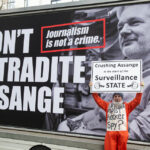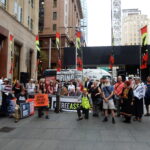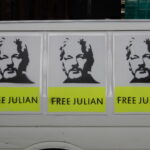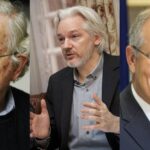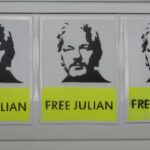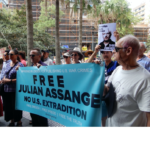The Trump Administration Plotted to Kidnap Assange and Pondered Assassinating Him
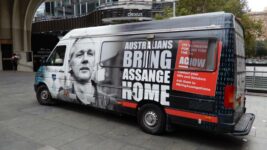
Discussions as to whether to kidnap Julian Assange and even assassinate the WikiLeaks founder were had at the highest levels of the Trump administration in 2017, in response to his organisation having published top secret information, which constituted “the largest data loss” in CIA history.
According to a recent Yahoo News piece, which was based on interviews with 30 former US officials, then CIA director Mike Pompeo sought revenge against the Australian journalist, in response to his revealing the contents of Vault 7: a secret manual outlining CIA hacking tools.
Pompeo publicly announced that he considered Wikileaks a “non-state hostile intelligence service”, whilst the Central Intelligence Agency commenced surveilling Wikileaks personnel, bugging Assange as he was holed up in the London Ecuadorian embassy, as well as stealing electronic devices.
By the end of 2017, however, Washington came across intel suggesting Ecuador might grant Assange diplomatic status and send him to Russia.
So, US officials considered how to disrupt any Moscow transfer operation, which included contemplating ramming the vehicle carrying Assange as it cruised through London streets and asking the UK whether its agents might fire any necessary shots, to which the Brits said no.
“Nothing’s off limits”
The Obama administration wasn’t concerned with WikiLeaks until the Snowden NSA revelations were released in 2013.
US intelligence then began investigating the organisation and considered whether to reclassify Assange as an “information broker”, which would expand available inquiry powers.
In mid-2016, as the US election campaign was underway, Wikileaks published Democratic Party emails, which the CIA concluded were hacked by Russian intelligence.
Assange denied the Russians were behind providing the leaks, but the idea he was colluding with others to harm the US prevailed.
Following Trump appointing him as CIA director, Pompeo called Wikileaks out as a “non-state hostile intelligence service” at the Centre for Strategic and International Studies in April 2017. This was five weeks after the organisation had announced that it was in possession of the highly classified Vault 7.
This designation of Wikileaks as a hostile actor was official. And it led Pompeo to ask senior CIA officers to contemplate all possible responses, with no limits.
Kidnapping plots were run by the UK, but it refused such proposals. One interviewee stated that Trump flagged the idea of possibly assassinating the Australian citizen. But it was White House lawyers that killed the proposals, insisting the plots would be illegal.
The extradition appeal
A group of prominent Australian lawyers, academics and activists wrote to prime minister Scott Morrison in response to the kidnapping revelations, requesting they be informed as to whether they were surveilled, and if the government was aware of the US Wikileaks operation.
Currently, Assange continues to be detained in London’s Belmarsh prison. The United States is set to appeal the UK decision not to extradite the Australian journalist on the 27th and 28th of this month. Although the final decision may not be made this year.
If Assange is extradited to the US, he would face 17 espionage charges and one count of hacking, which together carry a maximum penalty of 175 years.
The Westminster Magistrates’ Court found in January that while the US case held, the journalist shouldn’t be extradited as Washington couldn’t ensure Assange wouldn’t take his own life due to the torturous conditions within its maximum-security prison system.
However, the UK High Court ruled in August that Washington can now challenge these mental health findings.


